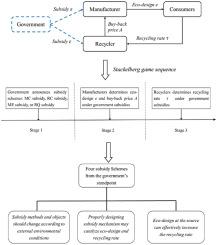Journal of Cleaner Production ( IF 9.7 ) Pub Date : 2021-10-16 , DOI: 10.1016/j.jclepro.2021.129391 Hong Yu 1 , Xiangyun Chang 1 , Wenjie Liu 2

|
Using the Stackelberg game theory, this paper evaluates the effectiveness of four subsidy schemes on the product eco-design and recycling rate in a manufacturing–recycling system that comprises a government, a manufacturer and a recycler. The principal results are: 1) For the cost-based subsidies, a fixed-cost subsidy to recyclers always yields higher recycling rate and social welfare. For the performance-based subsidies, the effects are closely related to market demand and the fixed cost coefficients of eco-design and recycling. Governments should select subsidy schemes according to the specific goals and market conditions. 2) Four subsidy schemes are the effective forces to promote product eco-design and recycling. Higher subsidy intensity brings better supply chain profits and better environment performance, but it does not always bring better social welfare. 3) Eco-design can increase waste recycling rates effectively, and recycling rates are more sensitive to eco-design when the government subsidizes the fixed costs of recyclers.
中文翻译:

考虑产品生态设计的制造回收系统中的成本补贴和绩效补贴
本文运用斯塔克尔伯格博弈理论,在一个由政府、制造商和回收商组成的制造-回收系统中,评估了四种补贴方案对产品生态设计和回收率的有效性。主要结果是: 1)对于成本补贴,对回收商的固定成本补贴总是产生更高的回收率和社会福利。对于基于绩效的补贴,其效果与市场需求和生态设计和回收的固定成本系数密切相关。政府应根据具体目标和市场情况选择补贴方案。2)四项补贴计划是推动产品生态设计和回收利用的有效力量。更高的补贴强度带来更好的供应链利润和更好的环境绩效,但它并不总能带来更好的社会福利。3)生态设计可以有效提高废物回收率,当政府补贴回收商的固定成本时,回收率对生态设计更敏感。











































 京公网安备 11010802027423号
京公网安备 11010802027423号